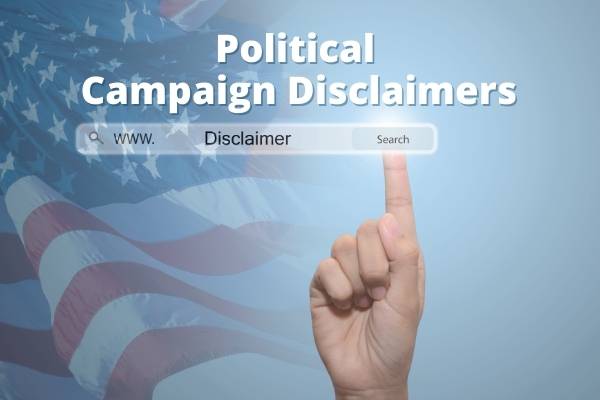All US jurisdictions have laws covering the use of disclosure statements on political advertising. Specific items that both require a political disclosure statement include billboards, bumper stickers, sample ballots, newspaper ads, TV and radio ads, magazines, mass mailings, pamphlets, fliers, palm cards, and even email.
Political campaigns must use a disclaimer for any public communications or political advertisement. Disclaimer requirements also apply if you are a:
- Candidate
- Political committee
- Election or campaign committee
- Political party
- Political action committee providing independent expenditures
The Federal Election Commission (FEC) defines public communications as “paid or unpaid announcements to the general public, such as advertisements, speeches, and articles printed in a newspaper.”
Here are other types of communication where a political disclaimer is required:
- Broadcast, cable or television ads
- Billboards
- Newspaper or magazine
- Mass mail and email
- Phone bank calls
- Online advertising, including social media and banner ads
- Other public campaign communications
Ballot measure and independent expenditure advertisements often require higher scrutiny under disclaimer rules. This is because, unlike political parties or a campaign committee, the public may not fully be aware of the organizations sponsoring those communications.
Political Disclaimer Types for Online Use
Online advertising communications
Facebook and Google both require verification of a candidate and committee before they allowed to advertise on their respective platforms.
You must also provide disclosure language in order to run online political advertising. Google and Facebook, for example, both require authorization of who is responsible for the advertising in addition to actual disclaimers in the advertisement.
For display ads, like those used in IP targeting, political advertisement rules require a readable notice as to what organization or committee made the expenditure on the ad graphic itself. Ads will get rejected if the disclaimer is too small and unreadable. In addition, information must be provided that identifies who paid for the ad, including a physical address, website address and the committee treasurer information.

A political ad disclaimer example.
Political Website Disclaimers
For political campaign websites, there are three standard disclaimers. Not only do they help you comply with the law, but they also help protect you legally.
Besides the “Paid for” disclaimer on your website footer, you should include the following disclaimers:
Authorization Disclosure
The specific wording required varies but it is usually some variant of candidate committee authorization. For example, “Paid for and Authorized by [the candidate or political group]“. Adding that text to a political website is simple, and most campaigns place this information near the bottom of each web page.
Your site should also feature a contact page that includes a full address, name and information about the political committee or sponsoring organization.
Privacy Policy
Most people don’t read ‘legalese’, but a good privacy policy helps build trust, particularly with potential donors. It’s best to be restrictive with your privacy policy and promise not to sell or share visitor information with anyone. This section can also cover users under a particular age, typically age 13. The stronger your privacy policies, the better. Spell them out in a plain sentence or two, followed by more detailed information.
Terms of Use
Sometimes these are lumped together with the privacy policy. Other times they are broken out. Your terms of use may cover a variety of situations. Political campaigns will want to be sure to address the following:
- Language that the site materials are provided ‘as-is’.
- Limitations: Limiting liability for any user damages from use of the site.
- Revisions: Disclaimer language that the material on the site may not be accurate, and that the organization accepts no liability for inaccurate information.
- Links: That you are not liable for any content on outside websites, and that there is no endorsement implied to outside content.
- Governing law: Of the appropriate state.
If you are unsure of what to add for your political campaign policies, look at another site’s policy as a template, but be sure to modify it fully for your needs. In other words, don’t copy a policy from an online retailer; it will look pretty silly if your page include information about product returns and call center hours.
Online Candidate websites include places for you to easily add your disclaimers – along with sample copy. Find out which package is best for you.
« A List of Our Best Judicial Campaign SlogansQuestions for First-Time Political Candidates »






